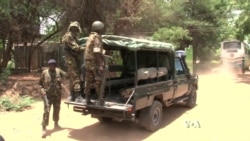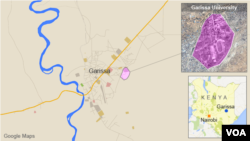Victims of the devastating terrorist attack that left 148 people dead last week in Garissa, Kenya, are trying to pick up the pieces of their shattered lives.
The Kenyan military is keeping a tight grip on the town of Garissa after the April 2 terror attack.
Garissa county is under a night-time curfew, along with three other counties frequently threatened by al-Shabab.
Garissa has seen sporadic bomb and grenade attacks in recent years, blamed on the Somali militants. But nothing of this magnitude.
At Garissa hospital, student survivors recount gruesome stories of a day of horror.
One student, Quintin Anyango, said she was just getting up for an early study session when the attack began.
“When I moved out, I saw other three strange people with their guns, I stood for a moment, then from there I decided not to go back to the hostel, but to look for somewhere, where I could hide safely," she said.
She said she hid the entire day, listening to the gunshots as her classmates were executed in a nearby lecture hall.
Anyango said she would go back to school some day but just not here.
“If it is Garissa, I don’t see me coming back. If it is anywhere, apart from Garissa, I will continue with my education,” Anyango said.
Al-Shabab said the attack was retaliation for Kenya’s mistreatment of Muslims, as well as its role in Somalia.
But Muslim residents have been quick to condemn the terrorist group. Some local leaders have even called for Somali refugees living nearby to be sent back.
Kenyan President Uhuru Kenyatta in an address to the nation Saturday said terrorists were plotting their attacks from within Kenya, and promised a swift crackdown on those responsible.
“We will not allow them to continue their lives as normal. The full force of the law will be brought to bear with even greater intensity than has been the case in previous years,” Kenyatta said.
Meantime, victims of the attack are still looking for answers.
At an accounting center in Garissa, workers keep track of which students - out of more than 800 at Garissa University College - have been identified, dead or alive.
David Muciri, an instructor at another nearby college, has been poring through the lists and fielding calls from the worried parents of students still missing.
“It’s traumatizing, I must say it is, even us as the neighbors of the university we are really feeling touched because we don’t know what will happen to us, maybe we are next, we don’t know,” Muciri said.
The trauma of the attack will resonate in Garissa and towns across Kenya for a some time. And any future retaliation by the government may only add to the tension.







